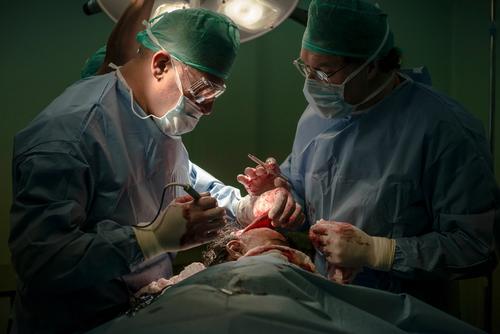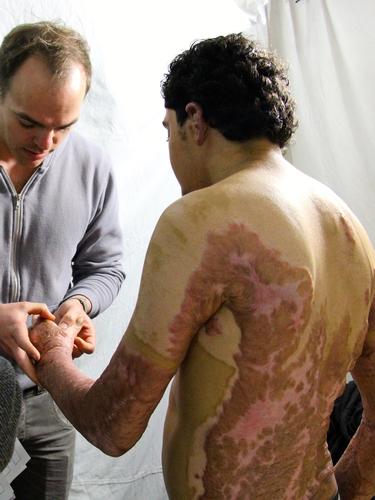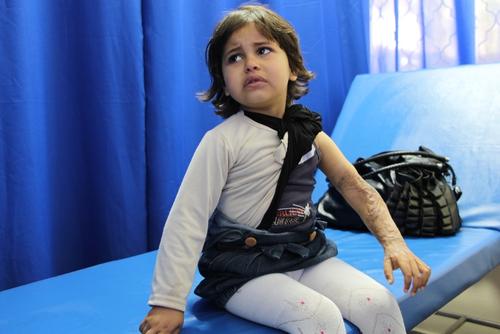- One year report
Share
16 July 2015

Yann Libessart/MSF
Plastic surgery on a patient with burn wounds on the head.
Gaza is regularly subjected to outbursts of violence. Most recently, Israel’s ‘Operation Protective Edge’ targeted Gaza Strip for 50 days in July and August 2014 – the deadliest and most destructive of Israel’s three wars on Gaza since 2008. To date, Gaza is almost completely sealed off by a blockade imposed by Israel, which has been bolstered by the near-total closure of the Rafah crossing to Egypt since October 2014.
MSF’s activities in Gaza have evolved in response to people’s changing needs. Currently they include surgery, post-operative care, specialised dressings care, psychological care, occupational therapy and physiotherapy, including a specialised unit dedicated to physiotherapy of the hand.
Since MSF launched its surgical programme in 2009, more than 1,400 patients have received surgery. Before last summer’s war on Gaza, more than 60 percent of our patients receiving surgical care were burns cases. During the last war this changed, with some 85 percent of our surgical patients treated for war injuries. In 2015, with the continuing blockade leading to extensive power cuts, around 75 percent of our patients have burns injuries.
Emergency surgery during the war
MSF’s post-operative clinic in Gaza City remained open during the 2014 offensive, run by a skeleton team of key staff. In total, 165 new patients were treated between 15 July and 24 August 2014, while the team continued to provide follow-up care to existing patients in a critical condition.
During the first week of the conflict, additional MSF surgical and emergency teams arrived in Gaza City and immediately started work in the surgical units, intensive care units and emergency rooms of Al Shifa and Nasser hospitals. An MSF team also supported the burns unit in Al Shifa hospital, operating on 85 patients in August alone.
During the 50 days of the war, the demand for reconstructive surgery in Gaza dramatically increased, and MSF established an emergency surgical team in Gaza to perform lifesaving operations. A permanent reconstructive surgery team stayed on in Gaza until December 2014. Since then, an MSF team has made regular short visits to Gaza to carry out reconstructive surgery.

Susanne Doettling/MSF
Nadir, a 20-year old architecture student. During the war, the Israeli army shot at Nadir while he was opening a gas canister, which exploded. He has severe burns on his hands, arms, back and abdomen. MSF surgeons have performed surgery on him but he needs follow-up procedures. The last round, scheduled by MSF for the end of April, had to be postponed when the MSF surgeon, who had already arrived in Jerusalem, was not authorised by Israel to enter Gaza.
War-related and domestic burns injuries
One year after the war, life amidst the ruins and under the Israeli blockade is extremely tough. Power cuts are a daily reality, and MSF’s clinics in Gaza City and Khan Younis are full of children with severe burns from household cooking accidents in homes damaged during the war. In June this year, for example, more than 80 percent of all the patients treated at MSF facilities in Gaza were burns victims, 65 percent of them children under the age of 15.
In April 2015, in the course of a 15-day visit, an MSF surgical team conducted 30 complex surgeries, two-thirds of them on children. Ninety percent had burns injuries, and the remaining 10 percent had trauma injuries. MSF teams have already identified 113 patients to be treated for burns injuries during the next surgical round. Others are in need of reconstructive surgery or physiotherapy after being injured in last summer’s war.
MSF has 350 patients on its waiting list for reconstructive surgery, and struggles to refer patients to Jordan to its hospital specialising in war surgery, as Gazans cannot easily get permission to leave Gaza, even for specialised care. Up until June 2015, MSF had only managed to refer four patients for treatment elsewhere. Getting specialised burns surgeons into Gaza is also a struggle. In April 2015, the Israeli Civil Administration blocked one of our surgeons from entering Gaza, forcing us to cancel a second round of burns surgeries planned to start in late-April.
Half of Gaza’s population, some 950,000 people, are children under the age of 18. They are particularly traumatised and brutalised by the wars and by the devastating effect of the ongoing blockade on their daily lives. The UN estimates that some 551 children were killed in the 2014 war on Gaza, many in their own homes. One-third of the 3,000 children injured in the conflict are likely to have physical disabilities for the rest of their lives, while many of those who escaped physical injury are in need of psychological care.
The majority of patients in MSF’s post-operative care clinics in Gaza City and Khan Younis are children with injuries either from the war or from domestic accidents, often due to living in damaged homes or makeshift shelters, under extensive power cuts due to the ongoing blockade.

Susanne Doettling/MSF
Iman, 3 years old, injured her arm in a domestic accident with boiling water. Surgery was performed by MSF in April 2015.
Preventing domestic burns
MSF’s first burns awareness campaign was launched in October 2014, targeted mainly at mothers and children. Its aim was to prevent the domestic accidents that cause burns, and to spread the message that once a child gets burnt, any delay in getting medical care can be dangerous. An interactive programme was developed specifically for primary schoolchildren and their teachers and parents.
Between December 2014 and April 2015, the MSF burns awareness campaign reached more than 32,000 children in more than 80 schools and kindergartens across the Gaza Strip. During the same period, more than 3,000 teachers and parents attended presentations on preventing accidents that might result in children getting burnt.
MSF has also continued to run specialised training sessions for hospital staff alongside the Ministry of Health. In late-April 2015, 120 nurses at Al Shifa hospital in Gaza City attended a training on providing intensive care.
MSF has been working in Gaza since 1989, providing medical care according to people’s needs. Medical activities have included surgery, post-operative care, specialised dressings care, psychological care, occupational therapy and physiotherapy, including running a specialised unit dedicated to physiotherapy of the hand. MSF addresses specific medical needs that cannot be met by Gaza’s health service, and responds to the direct or indirect consequences of violence. In the West Bank, MSF has been running mental health programmes in Jenin, Hebron, Nablus and Qalqilya governorates since 2000, which were extended to East Jerusalem in 2011.